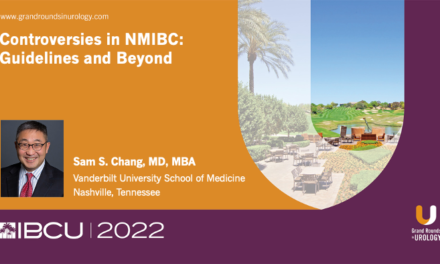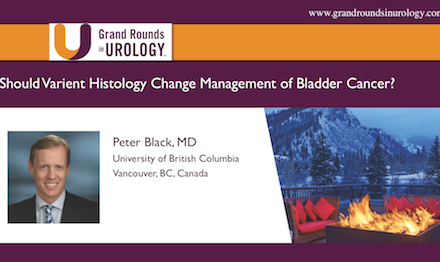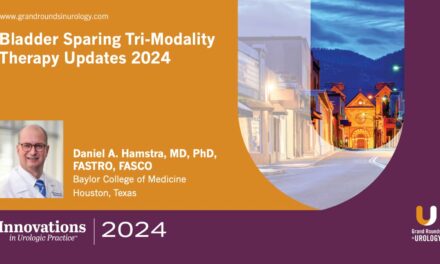Sia Daneshmand, MD, presented “Controversies in Non-Muscle Invasive Bladder Cancer” during the 19th Annual Future Directions in Urology Symposium on August 11, 2018 in Colorado Springs, Colorado.
How to cite: Daneshmand, Siamak. “Controversies in Non-Muscle Invasive Bladder Cancer” August 11, 2018. Accessed [date today]. https://grandroundsinurology.com/controversies-in-non-muscle-invasive-bladder-cancer/
Controversies in Non-Muscle Invasive Bladder Cancer – Summary:
Siamak Daneshmand, MD, reports on recent controversies in treatment for non-muscle invasive bladder cancer (NMIBC) regarding chemotherapy options for reducing post-transurethral resection (TUR) recurrences and active surveillance for low-grade patients, as well as alternatives to cystectomy in high-grade patients.
Recent Controversies in Low-Grade NMIBC
Intravesical chemotherapy post-TUR with mitomycin has been standard of care for low-grade NMIBC. Trials have shown that this method can reduce recurrence rates in these patients. However, mitomycin can cause toxicity and idiosyncratic reactions in a certain percentage of patients. Fortunately, a recent Southwest Oncology Group (SWOG) study by Messing et al. showed that gemcitabine reduced recurrence rates in post-TUR NMIBC patients, supporting this drug as an alternative to mitomycin. The question as to whether mitomycin should continue to be the drug of choice in this setting, or if gemcitabine should replace it, needs more exploration in the future.
Improved Diagnostic Tools in NMIBC
Enhanced cystoscopy, such as narrow band imaging and blue light cystoscopy, allow physicians to better detect tumors at earlier stages. Flexible blue light cystoscopy is also available for use in the office. These advancements raise questions regarding the possibility of managing NMIBC patients in the office. Because of these enhanced detection tools, mounting evidence supports active surveillance for patients with comorbidities.
Recent Controversies in High-Grade NMIBC
Traditionally, physicians have used histological, clinical features to assess high-grade T1 disease. Recently, molecular prognostication and characterization methods have emerged that could add to traditional tumor assessment methods.
While cystectomy can be curative for high-grade TI disease, it can be overtreatment for patients without aggressive features or with focal high-grade TI. Fortunately, with the increased recognition of variant histologies, physicians can better stratify patients to determine which patients should undergo cystectomy and which patients should not. Additionally, future research should evaluate chemotherapy and radiation as an alternative therapy for high-grade T1 patients.
About Dr. Daneshmand
Dr. Daneshmand is the Director of Urologic Oncology at University of Southern California in Los Angeles. He has extensive experience in clinical research for and the management of bladder cancer.
About the Future Directions in Urology Symposium
The Future Directions in Urology Symposium (FDUS) is an annual collaborative meeting with a faculty consisting of the top researchers, physicians, and educators in the field of urology. During FDUS, experts provide updates on recent developments and debate innovative management approaches in genitourinary cancers and urologic conditions. Subsequently, the experts devise consensus statements in accordance with the discussions held in the meeting.
In this video, Dr. Daneshmand discloses the thesis of the discussion he led during FDUS.
ABOUT THE AUTHOR
Siamak Daneshmand, MD, is Professor of Urology and Medicine (Oncology) with Clinical Scholar designation and serves as Director of Urologic Oncology, as well as the Urologic Oncology (SUO) Fellowship Director at the University of Southern California (USC) in Los Angeles. His main clinical interests include bladder cancer, testicular cancer, and advanced kidney cancer. He is a leading authority in the management of complex germ cell tumors and nerve-sparing retroperitoneal lymph node dissection (RPLND) following chemotherapy for advanced testicular cancer and is one of the highest volume surgeons for this disease in the country. His main research interests focus on the use of pathways to improve perioperative outcomes following radical cystectomy and post-chemo RPLND, use of serum and molecular markers and new technologies in diagnosis and management of bladder and testicular cancers, as well as functional outcomes following orthotopic urinary diversion. He serves on the American Urological Association (AUA) guidelines panel for non-muscle invasive bladder cancer, as well as the AUA guidelines panel for testicular cancer. He currently serves as the chair of bladder section of the Society of Urologic Oncology Clinical Trials Consortium (SUO-CTC), is on the scientific steering committee of several bladder cancer clinical trials, and has led over a dozen clinical trials in bladder cancer and a pivotal trial in testicular cancer (SEMS). He is currently secretary of the Western Section of the AUA. He is a member of Alpha Omega Alpha medical honor society and has been designated one of the “America’s Top Cancer Doctors” for the past 12 consecutive years. He has been a career leader in academic investigations in bladder cancer and germ cell tumors and was recently appointed as the chair of the SWOG Cancer Research Network local bladder committee. He has been a visiting professor at more than 25 institutions around the world. He has presented over 500 abstracts at scientific meetings and has authored over 375 peer-reviewed articles, reviews, and book chapters.
Dr. Daneshmand earned his medical degree at the University of California, Davis, and completed his residency at the University of Southern California, followed by a two-year fellowship in Urologic Oncology at the University of Southern California’s Norris Comprehensive Cancer Center.




